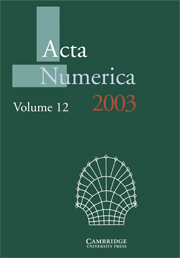Book contents
- Frontmatter
- Contents
- Survey of meshless and generalized finite element methods: A unified approach
- Continuous dependence and error estimation for viscosity methods
- Computational high frequency wave propagation
- Model reduction methods based on Krylov subspaces
- A mathematical view of automatic differentiation
- Geometric numerical integration illustrated by the Störmer–Verlet method
- Entropy stability theory for difference approximations of nonlinear conservation laws and related time-dependent problems
Survey of meshless and generalized finite element methods: A unified approach
Published online by Cambridge University Press: 07 September 2010
- Frontmatter
- Contents
- Survey of meshless and generalized finite element methods: A unified approach
- Continuous dependence and error estimation for viscosity methods
- Computational high frequency wave propagation
- Model reduction methods based on Krylov subspaces
- A mathematical view of automatic differentiation
- Geometric numerical integration illustrated by the Störmer–Verlet method
- Entropy stability theory for difference approximations of nonlinear conservation laws and related time-dependent problems
Summary
In the past few years meshless methods for numerically solving partial differential equations have come into the focus of interest, especially in the engineering community. This class of methods was essentially stimulated by difficulties related to mesh generation. Mesh generation is delicate in many situations, for instance, when the domain has complicated geometry; when the mesh changes with time, as in crack propagation, and remeshing is required at each time step; when a Lagrangian formulation is employed, especially with nonlinear PDEs. In addition, the need for flexibility in the selection of approximating functions (e.g., the flexibility to use non-polynomial approximating functions), has played a significant role in the development of meshless methods. There are many recent papers, and two books, on meshless methods; most of them are of an engineering character, without any mathematical analysis.
In this paper we address meshless methods and the closely related generalized finite element methods for solving linear elliptic equations, using variational principles. We give a unified mathematical theory with proofs, briefly address implementational aspects, present illustrative numerical examples, and provide a list of references to the current literature.
The aim of the paper is to provide a survey of a part of this new field, with emphasis on mathematics. We present proofs of essential theorems because we feel these proofs are essential for the understanding of the mathematical aspects of meshless methods, which has approximation theory as a major ingredient. As always, any new field is stimulated by and related to older ideas. This will be visible in our paper.
- Type
- Chapter
- Information
- Acta Numerica 2003 , pp. 1 - 126Publisher: Cambridge University PressPrint publication year: 2003
- 4
- Cited by



